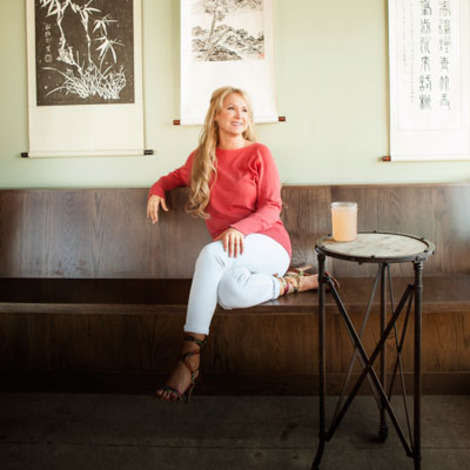How One Mother Overcame Her Prescription Pill Addiction

With her long, straight blond hair, Dawn Lindner, 48, who is from East Gull Lake, Minn., looks like the girl next door -- a grown-up Marcia Brady. But after working for years in her family's media business and being the guardian of her mentally disabled brother for more than a decade, Lindner became addicted to pills. "I was in emotional and physical pain," she says.
In 2009, after a difficult, lengthy custody battle with her ex, "a wave of depression came over me," she says. Then, in quick succession, she was diagnosed with menorrhagia (excessive menstrual bleeding) and interstitial cystitis (a painful bladder disorder). Lindner had a hysterectomy and suddenly found herself taking a slew of prescriptions from several doctors, all on automatic refill -- including antidepressants, pain relievers and anti-anxiety medication. "It felt like my body was turning on itself," she says. She had never been a drinker, but on the pills, she began craving wine by the bottle. Things got ugly fast. "I had a screaming fit at work," she says. "I showed up to Thanksgiving high as a kite. I began blacking out every night." Lindner's dad, a recovering alcoholic who had been sober for years, persuaded her to go to an Alcoholics Anonymous meeting. She went, took a copy of the group's Big Book home, then kept taking pills -- which fueled her drinking.
Related: Facebook Helps Reunite Sisters After 40 Years
A few months later, Lindner was pulled over for driving under the influence and had to stay in jail overnight. "I was crying, 'Please let me out of here; I don't belong here!' " she says. She also was worried that her 15-year-old daughter was home alone, though after being released the next day, she learned that her sister had taken care of the teen. Relieved, Lindner agreed to check herself into an inpatient rehabilitation facility. "I went through intensive therapy there," she says. "For the first time, I looked at patterns in my life -- particularly those with men. I realized that while my relationships hadn't caused my addiction, they had contributed to it." Lindner came home feeling renewed, but within a few months, she was abusing drugs and alcohol again.
"Whenever my brothers or sisters came over and threw out my pills, I'd drink instead," she says. "If they got rid of my wine, too, I'd figure out a way to get pills. Usually I had both." In the fall of 2011, Lindner says, she went out with friends and ended up at one's lake house: "I remember leaving the house and going down to the boat. Then I woke up in a hospital room." Fifteen hours had passed. "I pulled out my IV and the catheter," she says. "I found my clothes, which had been all cut off me in the ambulance and left on a chair; I tied them back on. I hobbled out of there barefoot with my high heels in hand." The drinking and pill-taking continued, followed by a stint in outpatient rehab -- which didn't do the trick, either. By the end of 2011, Lindner's parents, her six siblings, her nieces and nephews, and her daughter were fed up, and her behavior only got more frightening. In a drug-and-alcohol-fueled mania, she'd decided to move with her daughter to Florida -- where she had no job, but where her mother had a second home. While she was packing that night, her friend Lana and one of her brothers and his wife showed up: "They didn't yell. They just said, 'You are not moving to Florida. You are going to inpatient rehab again. We are taking you there now.' On the way, we had to pull over so I could throw up into a snowbank from pill withdrawal."
Related: Why One Mother Gave Back Her Adopted Son
The third time around, rehab finally took. With the pills out of her system, Lindner could at last connect the dots and identify her problems: "I think that initial, brief visit to AA showed me that other people had this awful problem -- and that they could get better. Then, in rehab, I began to deal with my childhood and relationship issues. I learned about the disease of alcoholism and also zeroed in on the real problem, my prescription-drug abuse."
That was when she began the hard process of looking at her life and making amends to loved ones, starting with her child. "I apologized to my daughter and 16 other people," she says. "I would say, over and over, 'I am so sorry you had to see that and that I put you through this. I'm going to make the changes necessary to work this out and walk out of the place I've been in.' " She adds, "People think it will be hard to apologize, but it's not…particularly if it's to your child. It's actually very freeing."
Related: 9 Things You Need to Stop Stressing About
And most people in Lindner's life were spectacularly forgiving. One sister, though, avoided her for months. Finally, Lindner showed up at her door and asked if they could please talk: "And she let me have it. I just listened. She needed to release, and I was OK with that. By the end of the afternoon, we both felt much better. Not fixed, but on the way there."
"There is a certain tension between saying, 'Addiction is a disease, and I was sick' and taking responsibility for all the destruction you've done," Lindner says. "Every single day, I just get up and try again to strike that balance -- dealing with that has been the only way out of the crazy mess I made for myself."
- By Amanda Robb
More from Good Housekeeping:
